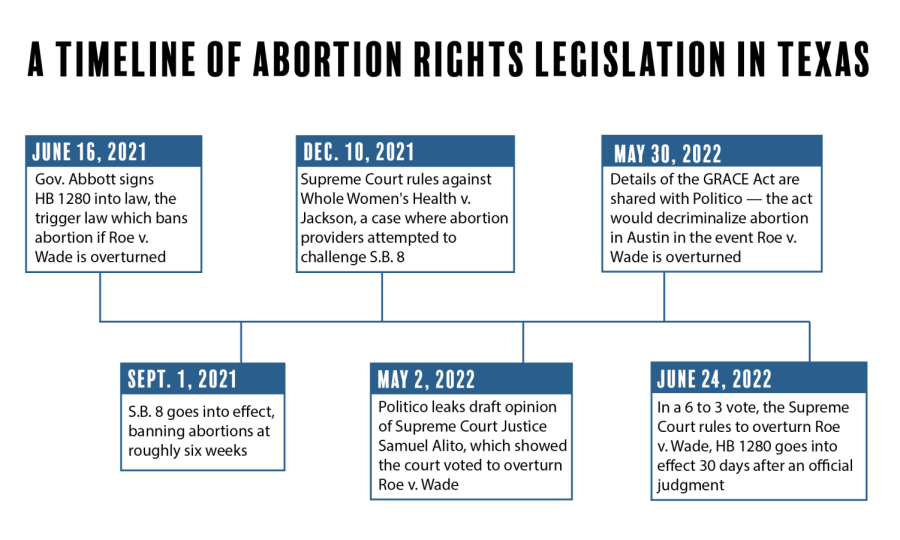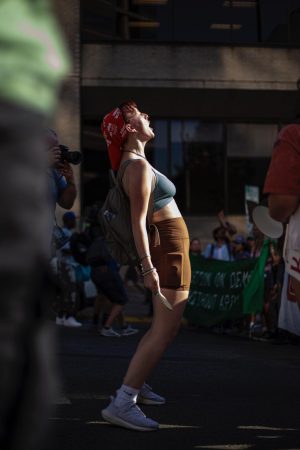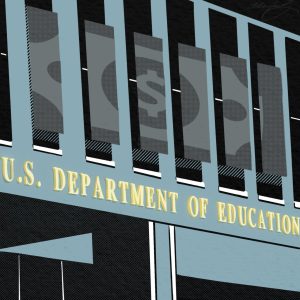City of Austin, Travis County to seek decriminalization of abortion amid impending Texas ‘trigger law’ following the overturn of Roe v. Wade
June 27, 2022
Following the U.S. Supreme Court’s decision to overturn Roe v. Wade, José Garza, Travis County district attorney, said in a press conference Monday that his office will “not criminalize personal healthcare decisions,” despite a state trigger law which is set to ban abortions in Texas soon.
In 2021, the state legislature passed House Bill 1280, or the “Human Life Protection Act,” a near-complete ban on abortions starting 30 days after any Supreme Court judgment that overturns Roe v. Wade. However, the Supreme Court’s decision last Friday was an opinion — not a judgment. Attorney General Ken Paxton said in an official advisory Friday that his office “cannot calculate exactly when” HB 1280 will go into effect, but will announce an effective date as soon as possible.
Once effective, HB 1280 will ban nearly all abortions in Texas — with no exceptions for rape or incest. The only exception is if the pregnant person is at risk for death or “substantial impairment of a major bodily function.” In all other cases, abortion care providers will be charged with a felony for performing the procedure, punishable by life in prison and fines up to $100,000. People who receive abortions cannot be prosecuted under HB 1280.
Garza said criminalizing abortion with a bill like HB 1280 will “only drive women to seek out dangerous alternatives.”
“If you need medical assistance, I implore you to seek it,” Garza said. “A prosecutor’s job is to protect public safety, and to enforce this law will not only fail to promote or protect public safety, but will also lead to more harm.”
Chito Vela, Austin City Council member, also called for the decriminalization of abortion in Austin. Vela sponsors the GRACE Act, which he first proposed to Politico in May. GRACE, which stands for “Guarding the Right to Abortion Care for Everyone,” would protect abortion seekers and providers in Austin by restricting city funds from investigating abortions and making them the “lowest priority” for police.
On Friday after the Supreme Court’s decision, Vela called for a special meeting of the city council for the week of July 18. Because the council is on summer break, this is the soonest it would be able to meet, Vela’s communications director Jenna Hanes said.
“The Austin City Council serves the interests of our people,” Vela said in a statement. “Banning necessary medical care like abortion endangers women’s health. The city of Austin will not be complicit.”
Law professor Richard Albert, who specializes in constitutional law, said decriminalization of abortion in Austin could be met with legal challenges.
“This is going to be a constitutional conflict between the city and the state,” Albert said. “Not unlike what we saw when it came to COVID restrictions when there were very, very tense disagreements in the city of Austin and the state of Texas.”
In the advisory Friday, Paxton said prosecutors may begin criminal prosecution against abortion providers immediately, stating that Texas penal code articles 1191-1194 and 1196, written before Roe v. Wade, are still Texas law. Paxton’s advisory has caused some abortion clinics and funds to discontinue service as soon as last Friday, according to The Texas Tribune.
The American Civil Liberties Union announced Monday in a tweet that it is suing Texas for “unlawful prosecutions of abortion providers under an antiquated pre-Roe law.”
Jeffrey Hons, president and CEO at Planned Parenthood South Texas, said in a press conference Friday that the company is not providing abortion care in Texas until their attorneys analyze the Supreme Court’s decision, Texas’ trigger law and Texas’ pre-Roe anti-abortion laws.
“We look forward to resuming every aspect of assistance and support that we can as soon as we know that doing so is compliant with the new legal framework and policy framework that is emerging around us,” Hons said.














